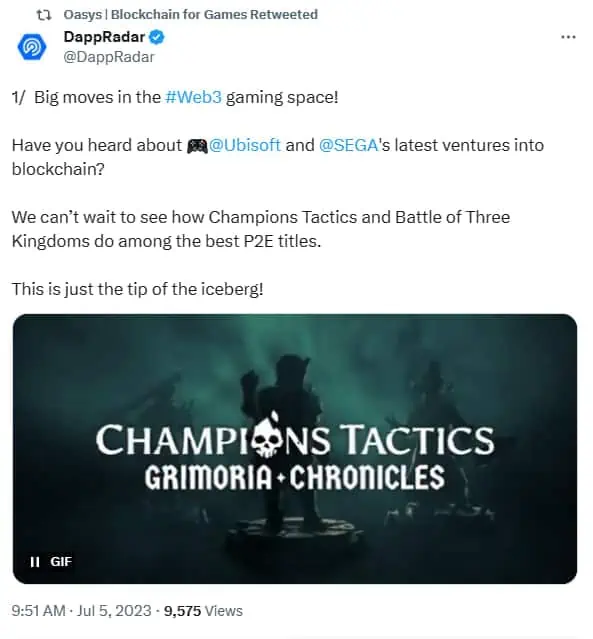
Two companies with a long history in the gaming sector are integrating their video games to Web3 through Oasys.
The Japanese blockchain Oasys, launched in October last year, has welcomed two of the largest developers in the video game sector: SEGA and Ubisoft. The companies, of Japanese and French origin, respectively, are using the Oasys blockchain to launch new video game titles adapted for Web3.
Although SEGA's relationship with Oasys has been known since late last year, the video game-focused blockchain has attracted a new player, Ubisoft, considered one of the largest video game developers and distributors in the world.
In a recent statement, Oasys reported that Ubisoft is using its blockchain infrastructure to develop “Champions Tactics: Grimoria Chronicles”, their new Web3 game.

Ubisoft expands into Web3 with Oasys
The French developer behind sagas such as Assassin's Creed, Far Cry y Just Dance, is working on a new computer strategy game titled Champions Tactics: Grimoria Chronicles, which is set in the fantasy world of “Grimoria” where players will be able to collect, train and battle magical creatures.
This new video game, developed on the Oasys blockchain, uses the block chain to ensure ownership, scarcity and interoperability of digital assets.
This is not the first time that Ubisoft has entered the blockchain and Web3 industry. In fact, the video game software developer is one of the members of the Hedera governing council, based on distributed ledger technology (DLT).
Ubisoft also launched the fun characters of Rabbids Royale in the Ethereum-based blockchain metaverse The Sandbox and created a collection of NFTs from its award-winning video game Assassin's Creed, which has more than 95 million unique players around the world, according to data from Hobby Consolas magazine.
SEGA and its projects for Web3
The Shinagawa-based Japanese video game developer is creating a new video game based on the collectible card game Sangokushi Taisen, inspired by the Three Kingdoms. The new game is called “Battle of Three Kingdoms” and will allow players to explore a vast open world, form alliances and fight for control of territories. All this while building a dynamic economic system, where you can trade, invest and govern with the game's resources.
According to the company, the players of Battle of Three Kingdoms They will be able to collect, exchange and fight with cards in NFT format that represent historical figures from the Three Kingdoms. These NFT cards will be compatible with other games based on the Oasys network.
SEGA is responsible for the development of classics such as Sonic, Streets of Rage y Yakuza.
What is Oasys?
Oasys is a blockchain developed for Web3 games that uses the Proof of Stake consensus protocol and is compatible with the Ethereum Virtual Machine (EVM).
SEGA and Ubisoft, in addition to the companies Bandai Namco, Com2uS, Wemade, Netmarble and Yield Guild Games, backed by Andreessen Horowitz (a16z), are part of the first validators of this blockchain.
More video game companies join the Web3 fiber
Among other important updates that Oasys recently reported, the thriving blockchain gaming ecosystem that the company Com2uS is creating to empower gaming communities stands out.
Likewise, in addition to Ubisoft, another company in the gaming sector that has joined the blockchain and Web3 fever is DM2C Studio, which has confirmed the launch of its first blockchain game titled “Coin Musume”.
On the other hand, Oasys has partnered with the MIXI company to take advantage of its extensive experience in social games in order to optimize the experiences it offers to its community of users.
Currently, blockchain video games have become a trend that grows every day and is gaining more fans as companies in the gaming sector enter this industry. The popularity seen in Web3 games is mainly due to the opportunities that the blockchain offers to allow players new ways to monetize, create and share digital content, in addition to maintaining ownership over the products and assets of the game. games.
Although the inclusion of blockchain technology in the gaming industry has met with considerable resistance, the capabilities of this technology and Web3 are persuading both gamers and high-profile companies.
Continue reading: Japan's giants join forces to accelerate Web3 innovation



